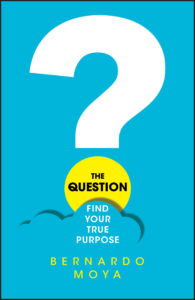How to be brilliant at failing in life, love and work
It’s official; we’re a nation of perfectionists – and that’s not a good thing. According to the World Health Organization, record numbers of young people are experiencing serious depression and anxiety disorders. Growing evidence suggests that the excessive standards we set for ourselves, our drive to be perfect, could be more harmful than we may realise.

While many of us may view perfectionism as a positive attribute, researchers are finding that it can have a dangerous side. Personal development coach Bernardo shares his thoughts on why it’s important to be good at failing in life, love and work – and how we can start doing that well.
How to be brilliant at failing in life, love and work

“Oh, I am such a failure. I’m useless. Why did I even start this?”
Sound familiar? If that’s how you talk to yourself when things start heading south, then maybe, just maybe, you haven’t learned the art of brilliant failure. To help you – here are five useful things to ask the next time you think you’ve failed:
1. Have I really failed? People who believe they’ve failed often think, “If this happens then I have succeeded. If anything else happens, I have failed.”
This binary thinking means people put too much meaning on one event. The reality is that life’s events are learning experiences and there are countless ways things might happen that, actually, could be positives, even though they’re not precisely what you wanted.
It’s true you might not win the heart of the person you love. But if it was such a struggle to win them over, are you sure they were the right person? In business, you’ll be amazed at how many opportunities arise when you stop focusing on the one event that didn’t go your way.
In almost every case, the answer to the question ‘have I really failed?’, is: “Not yet. I’ve just learned another thing not to do!” The Question to ask yourself is: what can I learn from this experience?
2. What do I need to learn to move on? Most setbacks carry a lesson inside them. Be careful what lesson you choose to learn. If you internalise the belief that this “failure” just proves you’re a loser, you are preparing to fail again and again, because you’re telling yourself what you do doesn’t matter, because you are the problem.
Analyse. Understand what was missing from your understanding before. What will you do differently next time?
3. How do I put this behind me? Once you’ve taken the juicy learnings out of your so-called failure, then file it away or throw it in the bin. You don’t need to keep reliving the scenes of your greatest disasters. You can do that with your next triumph instead.
Some people write down their experience then throw it in the bin, others refocus their thoughts and shrink the useless memory down in their minds to make room for the next step. Others just get on with the next job. How will you do it?
4. How can I turn where I am now into an advantage? There are many great stories about people turning problems into success. J.K Rowling was a divorced lone parent looking after her newborn. She used her time alone to write her first Harry Potter novel.
Ask yourself: how can you turn life’s lemons into a gigantic, ethical, billion-pound lemonade factory? Napoleon Hill said “Every adversity, every failure, every heartache carries with it the seed of an equal or greater benefit”
5. What’s next? Shake off the negative and look out for your next project. Is it – like Thomas Edison’s famous one thousand attempts to perfect the lightbulb – going to be a continuation of the current project? Or are you going to start something completely new?
Harrison Ford gave up going to auditions and started making furniture. When he was asked to make a new door at the studios where George Lucas was auditioning for Han Solo, that complete change became, literally, his doorway to success.
Remember, in life, love and work, maintaining an attitude that sees setbacks as part of an ongoing process, is creative in dealing with problems and is willing to learn and get quickly focused on to the next project – that is the key to being brilliant at failing – or failing brilliantly.
Let me ask you: how much can you learn from your failures? The answer is… loads.
 Bernardo Moya is a personal development coach, founder of The Best You, and author of The Question: Find Your True Purpose out now.
Bernardo Moya is a personal development coach, founder of The Best You, and author of The Question: Find Your True Purpose out now.
Find out more about personal development coaching and how a coach can help you reach your goals, discover whether you are happy, and develop the skills you wish to improve.

Find a coach dealing with Career coaching
All coaches are verified professionals





